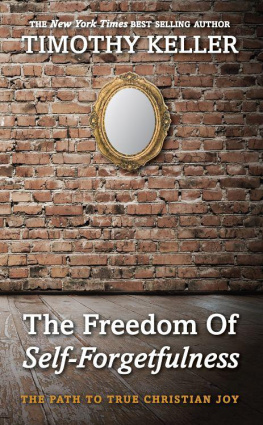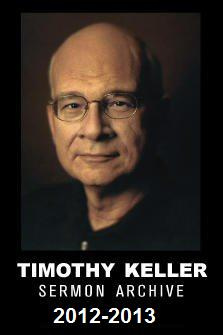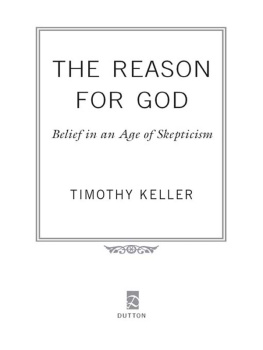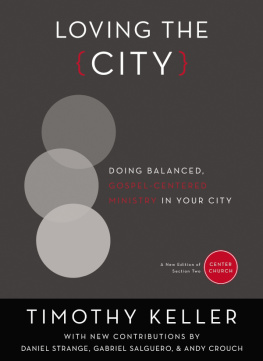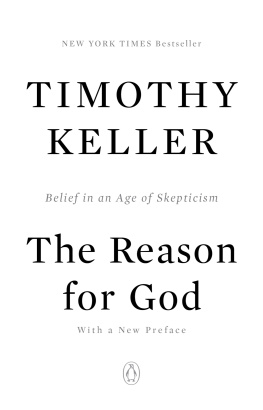
The Freedom Of Self-Forgetfulness
Timothy Keller, 2012 (Reprinted once) All rights reserved. Except as may be permitted by the Copyright Act, no part of this publication may be reproduced in any form or by any means without prior permission from the publisher.
Published by 10Publishing, a division of 10ofThose Limited ISBN: 9781906173418
eISBN 9781906173654
Scripture quotations are taken from THE HOLY BIBLE, NEW INTERNATIONAL VERSION, NIV Copyright 1973, 1978, 1984, 2011 by Biblica, Inc.
New King James Version. Copyright 1982 by Thomas Nelson, Inc.
Used by permission. All rights reserved worldwide.
Design and Typeset by: Diane Bainbridge Printed in the UK.
10Publishing, a division of 10ofthose.com
Unit 19 Common Bank Industrial Estate, Ackhurst
Road, Chorley, PR7 1NH, England.
Email:
Website: www.10ofthose.com
Tim Keller knows that personal freedom is only ever found in viewing yourself from the vantage point of the person and work of the Lord Jesus Christ. Read and experience that freedom yourself.
PAUL DAVID TRIP
President of Paul Tripp Ministries In this helpful little book, Dr Keller paints a compelling picture of a truly gospel-humble person who is so taken up with his Lord that he is freed from the constant need to think about himself. We were challenged by it: we pray that you will be too.
CHRISTOPHER & CAROLYN ASH
The Cornhill Training Course, London An excellent little piece. This is a truly liberating book for anyone whos ever worried about what others think of them or been caught up in conflict. Youll find your life explained and then put on the path to freedom.
TIM CHESTER
Author & Director of The Porterbrook Institute 
Contents
The Freedom Of
Self-Forgetfulness

What are the marks of a heart that has been radically changed by the grace of God? If we trust in Christ, what should our hearts be like? It is not simply a matter of morally virtuous behaviour. It is quite possible to do all sorts of morally virtuous things when our hearts are filled with fear, with pride or with a desire for power. We are talking about hearts that have been changed, at the root, by the grace of God and what that looks like in real life.
We will be focusing on a section of Pauls first letter to the Corinthians 1 Corinthians 3:21 4:7.
So then, no more boasting about men! All things are yours, whether Paul or Apollos or Cephas or the world or life or death or the present or the futureall are yours, and you are of Christ, and Christ is of God. So then, men ought to regard us as servants of Christ and as those entrusted with the secret things of God. Now it is required that those who have been given a trust must prove faithful. I care very little if I am judged by you or by any human court; indeed, I do not even judge myself. My conscience is clear, but that does not make me innocent. It is the Lord who judges me. Therefore judge nothing before the appointed time; wait till the Lord comes. He will bring to light what is hidden in darkness and will expose the motives of mens hearts. At that time each will receive his praise from God. Now, brothers, I have applied these things to myself and Apollos for your benefit, so that you may learn from us the meaning of the saying, Do not go beyond what is written. Then you will not take pride in one man over against another. For who makes you different from anyone else? What do you have that you did not receive? And if you did receive it, why do you boast as though you did not? 1 Corinthians 3:21 4:7

The Corinthian church was filled with division. It had originally been planted by Paul. But, as we see from the references to Apollos and Cephas, other evangelists had come to Corinth later on. As a result, different people had connections with different prominent ministers. So one person was mentored and discipled by Paul, another was mentored and appointed in leadership by Apollos (another great teacher) and so forth. Instead of everybody being happy that they had a relationship with Paul or with Apollos, these relationships are now the basis for power-play. Parties have arisen and divisions are tearing the church up. One person argues that he should be the leader because he was discipled by Paul, the Saint Paul. And another lays claim to a particular relationship with some other prominent minister. And so on.
In this passage, Paul shows that the root cause for the division is pride and boasting . That is the reason we cannot get along, the reason there is no peace in the world and the reason we cannot live at peace with one another. Have a look. Verse 21 starts off no more boasting; chapter 4:7 says why do you boast...?; and note verse 6 especially where he urges them not to take pride in one man over against another.
No pride, no boasting, says Paul. So we are after the trait of humility. And that means we get into the very interesting subject of self-esteem.
Up until the twentieth century, traditional cultures (and this is still true of most cultures in the world) always believed that too high a view of yourself was the root cause of all the evil in the world. What is the reason for most of the crime and violence in the world? Why are people abused? Why are people cruel? Why do people do the bad things they do? Traditionally, the answer was hubris - the Greek word meaning pride or too high a view of yourself. Traditionally, that was the reason given for why people misbehave.
But, in our modern western culture, we have developed an utterly opposite cultural consensus. The basis of contemporary education, the way we treat incarcerated prisoners, the foundation of most modern legislation and the starting point for modern counselling is exactly the opposite of the traditional consensus. Our belief today and it is deeply rooted in everything is that people misbehave for lack of self-esteem and because they have too low a view of themselves. For example, the reason husbands beat their wives and the reason people are criminals is because they have too low a view of themselves. People used to think it was because they had too high a view of themselves and had too much self-esteem. Now we say it because we have too little self-esteem.
A few years ago, there was an article in the New York Times magazine by psychologist Lauren Slater called The Trouble with Self-Esteem. It wasnt a ground-breaking article or a bolt out of the blue. She was simply beginning to report what experts have known for years. The significant thing she says is that there is no evidence that low self-esteem is a big problem in society. She quotes three current studies into the subject of self-esteem, all of which reach this conclusion and she states that people with high self-esteem pose a greater threat to those around them than people with low self-esteem and feeling bad about yourself is not the source of our countrys biggest, most expensive social problems.
It would be fun to explain how that works and why that works and so on. But, for now, lets just say she is right when she says it will take years and years for us to accept this. It is so deeply rooted in our psyche that lack of self-esteem is the reason why there is drug addiction, the reason why there is crime, wife beating and so forth. Slater says it is going to take forever for this view to change.
Next page
